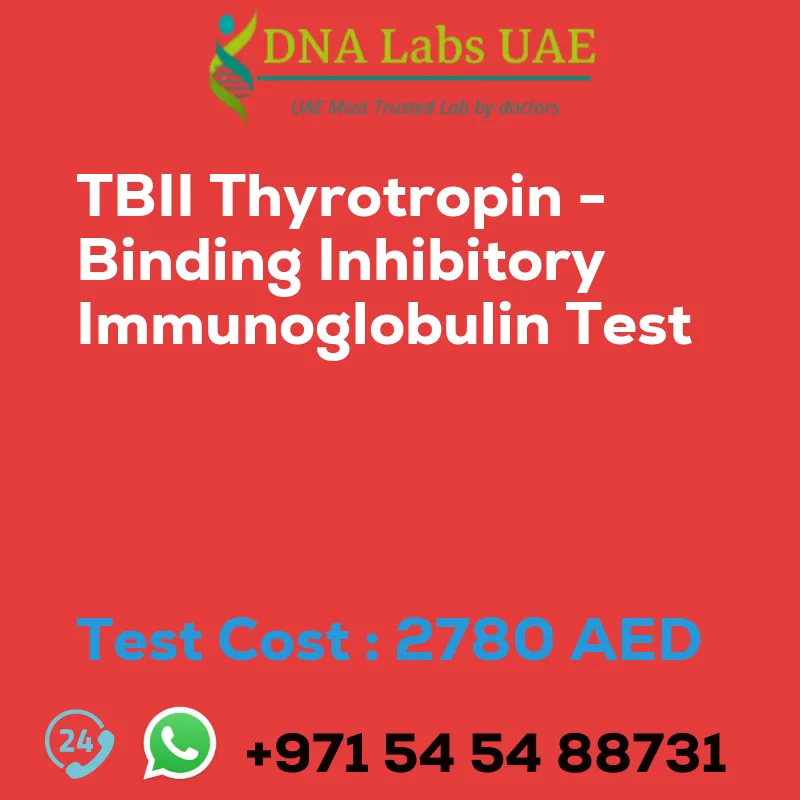TBII THYROTROPIN – BINDING INHIBITORY IMMUNOGLOBULIN Test
Cost: AED 2780.0
Symptoms, Diagnosis, and Test Details:
The TBII (Thyrotropin-Binding Inhibitory Immunoglobulin) test is a blood test used to measure the level of antibodies that inhibit the binding of thyrotropin (TSH) to its receptor on thyroid cells. Thyrotropin is a hormone produced by the pituitary gland that stimulates the thyroid gland to produce thyroid hormones.
In some autoimmune disorders, the immune system produces antibodies that can bind to the TSH receptor on thyroid cells, leading to overstimulation of the thyroid gland and excessive production of thyroid hormones. This condition is known as Graves’ disease.
The TBII test is primarily used to diagnose and monitor Graves’ disease. It helps determine the presence and level of inhibitory antibodies that interfere with the normal regulation of thyroid hormone production. High levels of TBII antibodies indicate an overactive thyroid gland and confirm the diagnosis of Graves’ disease.
The TBII test is usually ordered along with other thyroid function tests, such as TSH, free thyroxine (FT4), and total triiodothyronine (T3), to get a comprehensive evaluation of thyroid function. It is typically performed on a blood sample and results are reported as a numerical value or as a percentage inhibition.
The TBII test is useful in assessing the severity of Graves’ disease, monitoring the response to treatment, and predicting the risk of relapse. It is also occasionally used to differentiate Graves’ disease from other causes of hyperthyroidism.
It is important to note that the TBII test should be interpreted in conjunction with clinical symptoms and other laboratory tests to make an accurate diagnosis and guide appropriate treatment decisions. A healthcare provider, such as an endocrinologist, will be able to provide further information and guidance based on individual circumstances.
Test Components: 2 mL (1 mL min.) serum from 1 SST. Ship refrigerated or frozen. Duly filled Test Send Out Consent Form is mandatory.
Report Delivery: Sample by 7th of the month; Report after 2-3 weeks
Method: Radioreceptor Assay
Test Type: Disorders of Thyroid Gland
Doctor: Endocrinologist
Test Department: OS
Pre Test Information: Duly filled Test Send Out Consent Form is mandatory.
| Test Name | TBII THYROTROPIN – BINDING INHIBITORY IMMUNOGLOBULIN Test |
|---|---|
| Components | |
| Price | 2780.0 AED |
| Sample Condition | 2 mL (1 mL min.) serum from 1 SST. Shiprefrigeratedorfrozen. Duly filled Test Send Out Consent Formis mandatory. |
| Report Delivery | Sampleby7thofthemonth;Report after2??3weeks |
| Method | RadioreceptorAssay |
| Test type | Disorders of Thyroid gland |
| Doctor | Endocrinologist |
| Test Department: | OS |
| Pre Test Information | Duly filled Test Send Out Consent Formis mandatory. |
| Test Details |
The TBII (Thyrotropin-Binding Inhibitory Immunoglobulin) test is a blood test used to measure the level of antibodies that inhibit the binding of thyrotropin (TSH) to its receptor on thyroid cells. Thyrotropin is a hormone produced by the pituitary gland that stimulates the thyroid gland to produce thyroid hormones. In some autoimmune disorders, the immune system produces antibodies that can bind to the TSH receptor on thyroid cells, leading to overstimulation of the thyroid gland and excessive production of thyroid hormones. This condition is known as Graves’ disease. The TBII test is primarily used to diagnose and monitor Graves’ disease. It helps determine the presence and level of inhibitory antibodies that interfere with the normal regulation of thyroid hormone production. High levels of TBII antibodies indicate an overactive thyroid gland and confirm the diagnosis of Graves’ disease. The TBII test is usually ordered along with other thyroid function tests, such as TSH, free thyroxine (FT4), and total triiodothyronine (T3), to get a comprehensive evaluation of thyroid function. It is typically performed on a blood sample and results are reported as a numerical value or as a percentage inhibition. The TBII test is useful in assessing the severity of Graves’ disease, monitoring the response to treatment, and predicting the risk of relapse. It is also occasionally used to differentiate Graves’ disease from other causes of hyperthyroidism. It is important to note that the TBII test should be interpreted in conjunction with clinical symptoms and other laboratory tests to make an accurate diagnosis and guide appropriate treatment decisions. A healthcare provider will be able to provide further information and guidance based on individual circumstances. |








